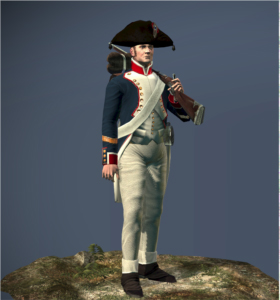Difference between revisions of "Militia (NTW Unit)"
m (Quick-adding category "NTW Unit" (using HotCat)) |
Tango12345 (talk | contribs) m (Quick-adding category "NTW Infantry" (using HotCat)) |
||
| (3 intermediate revisions by 2 users not shown) | |||
| Line 10: | Line 10: | ||
*[[France (NTW Faction)|France]] | *[[France (NTW Faction)|France]] | ||
*[[Denmark (NTW Faction)|Denmark]] | *[[Denmark (NTW Faction)|Denmark]] | ||
| + | *[[Portugal (NTW Faction)|Portugal]] | ||
| + | *[[Batavian Republic (NTW Faction|Batavian Republic]] | ||
| − | [[Category:NTW | + | |
| + | |||
| + | [[Category:NTW Units]] | ||
| + | [[Category:NTW Infantry]] | ||
Latest revision as of 07:52, 30 May 2017
Overview
Men in the militia rarely expect to be sent into battle. It is their lot to act as reserves, or local law enforcers. As a result, if they do find themselves on a battlefield, they should be expected to run away, and not handle their weaponry with any great proficiency. Militia may appear useless, then, but they are cheap to maintain and as plentiful as any bureaucrat could want.
In 1806, despite previous unfortunate experiences with disgruntled peasants, the Russian state recruited 600,000 serfs into the “opelchenie”, a militia. Training was basic, and weaponry similarly simple: the opelchenie were given pikes. After the French invasion of 1812 the opelchenie was no longer limited to serfs, and another 200,000 recruits joined in a national wave of patriotism. Some of this new cohort of serfs brought their own pitchforks and shovels as weapons.
